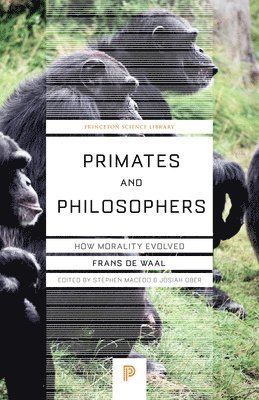
- Format
- Häftad (Paperback / softback)
- Språk
- Engelska
- Antal sidor
- 232
- Utgivningsdatum
- 2016-03-22
- Förlag
- Princeton University Press
- Originalspråk
- English
- Medarbetare
- MacEdo, Stephen (red.)/Ober, Josiah (red.)
- Illustratör/Fotograf
- 9
- Illustrationer
- 9 halftones. 3 tables.
- Dimensioner
- 213 x 137 x 18 mm
- Vikt
- Antal komponenter
- 1
- Komponenter
- Princeton Science Library
- ISBN
- 9780691169163
- 227 g
Primates and Philosophers
How Morality Evolved
- Skickas från oss inom 5-8 vardagar.
- Fri frakt över 249 kr för privatkunder i Sverige.
Passar bra ihop
De som köpt den här boken har ofta också köpt Knife av Salman Rushdie (inbunden).
Köp båda 2 för 402 krKundrecensioner
Fler böcker av författarna
-
Are We Smart Enough to Know How Smart Animals Are?
Frans De Waal
-
Different - Gender Through The Eyes Of A Primatologist
Frans De Waal
-
Chimpanzee Politics
Frans De Waal
Recensioner i media
"Frans de Waal defends against philosopher critics his view that the roots of morality can be seen in the social behavior of monkeys and apes... [H]e argues that human morality would be impossible without certain emotional buildings blocks that are clearly at work in chimps and monkey societies... Dr. de Waal sees human morality as having grown out of primate sociality, but with two extra levels of sophistication. People enforce their society's moral codes much more rigorously with rewards, punishments and reputation building. They also apply a degree of judgment and reason, for which there are no parallels in animals."--Nicholas Wade, The New York Times "De Waal is one of the world's foremost authorities on nonhuman primates, and his thoughtful contribution to Primates and Philosophers is enriched by decades of close observation of their behavior... He argues that humans are like their closest evolutionary kin in being moral by nature... [A]n impressively well-focused collection of essays."--John Gray, New York Review of Books "Celebrated primatologist Frans de Waal ... demonstrates through his empirical work with primates the evolutionary basis for ethics."--Publishers Weekly "Frans de Waal ... argues that ... morality is actually a gift from animal ancestors and that people are good not by choice but by nature... He argues that ... critics fail to recognize that while animals are not human, humans are animals."--Science News "Dutch-born psychologist, ethologist and primatologist Frans de Waal has spent his career watching the behavior of apes and monkeys, mostly captive troupes in zoos... His work ... has helped lift Darwin's conjectures about the evolution of morality to a new level... [De Waal argues that] sympathy, empathy, right and wrong are feelings that we share with other animals; even the best part of human nature, the part that cares about ethics and justice, is also part of nature."--Jonathan Weiner, Scientific American "Frans de Waal ... show[s] how elements of morality such as empathy, sympathy, community concern and a sense of fairness also exist in our closest primate relatives."--David Sloan Wilson, American Scientist "Exceptionally rich but always lucid... Intellectual soul food for biology-minded ethicists."--Ray Olsen, Booklist "In his new book, Primates and Philosophers, Frans de Waal argues that the origins of human goodness can be seen in apes and monkeys. He claims that we have evolved from a long line of social animals for whom close co-operation is 'not an option but a survival strategy'. Not only are we nice by nature, but our ancestors were too, ever since they came down from the proverbial trees."--Stephen Cave, Financial Times "Frans de Waal, an acclaimed primatologist, has much to say about what he considers the biological origins of morality. Unlike many recent antireligion writers such as Richard Dawkins, Sam Harris, and Daniel Dennett, who use the latest socio-biological research to campaign against religion, de Waal has no antireligious agenda. This both keeps his writing more focused and helps him avoid many of the argumentative errors of Dawkins and company...De Waal is a keen social observer, but he focuses mostly on what we can learn from what he knows best-the study of primates, including the human variety."--Joe Pettit, Commonweal "[A] remarkably interesting and rich set of reflections about the nature of morality, the social experiences of nonhuman primates, and the continuities and differences between the social experiences of human and nonhuman primates. The book can be read both as discussion on the nature of evolution and as a primer on ethical theory... All in all this is an extremely interesting book on a central human preoccupation-the question of our relationship with Nature-and is a demonstration that the collaboration of sympathetic points of view can prod
Övrig information
Frans de Waal is the C. H. Candler Professor of Psychology at Emory University and director of the Living Links Center at the Yerkes National Primate Center in Atlanta.
Innehållsförteckning
Acknowledgments vii Introduction by Josiah Ober and Stephen Macedo ix PART I: Morally Evolved: Primate Social Instincts,Human Morality, and the Rise and Fall of "Veneer Theory" by Frans de Waal 1 Appendix A: Anthropomorphism and Anthropodenial 59 Appendix B: Do Apes Have a Theory of Mind? 69 Appendix C: Animal Rights 75 PART II: Comments: The Uses of Anthropomorphism by Robert Wright 83 Morality and the Distinctiveness of Human Action by Christine M. Korsgaard 98 Ethics and Evolution: How to Get Here from There by Philip Kitcher 120 Morality, Reason, and the Rights of Animals by Peter Singer 140 PART III: Response to Commentators: The Tower of Morality by Frans de Waal 161 References 183 Contributors 197 Index 201


